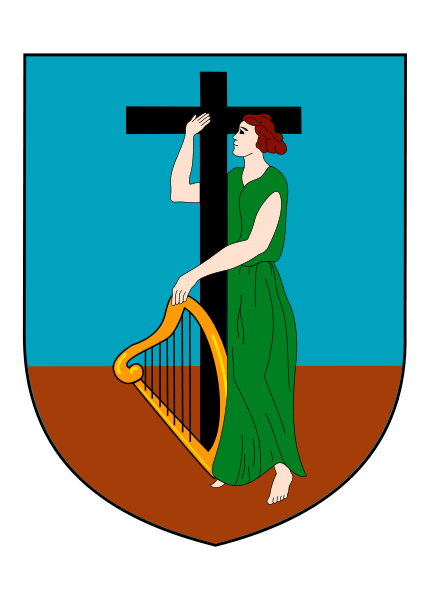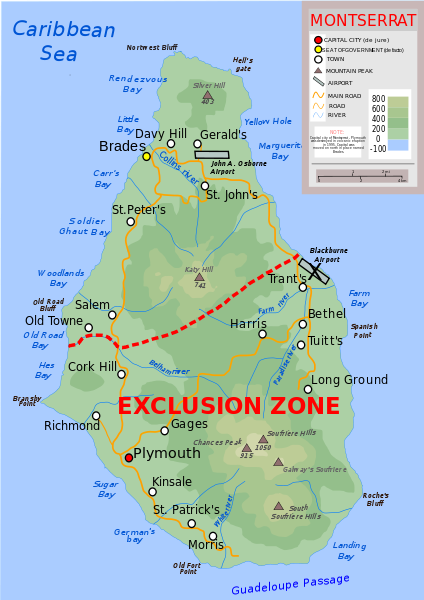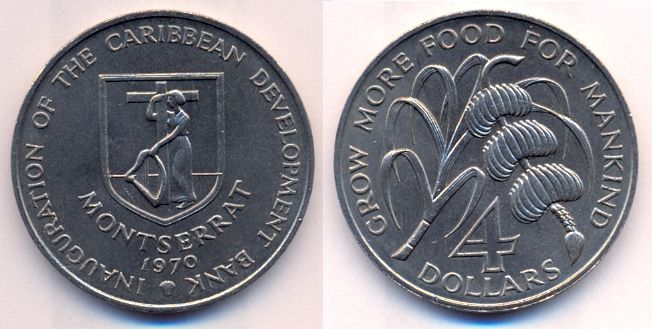 |
 |
| Montserrat |
|
|
 |
||
|
11 Nov 1493 Discovered and claimed by Spain by Christopher Columbus, named Isla de Santa Maria de Monstserrate 1632 part of British Colony of Antigua 22 Feb 1667 - 1668 French occupation 1668 - 1816 part of Leeward Islands colony 07 Jul 1712 - 20 Jul 1712 French invasion repulsed 22 Feb 1782 - Jan 1784 French occupation during the American Revolutionary War 1816 - 1832 part of Antigua-Barbuda-Montserrat colony 1833 - 01 Jan 1960 part of Leeward Islands (Antigua, British Virgin Islands, Dominica [to 1940], Montserrat, Saint Christopher-Nevis-Anguilla 1871 Leewards Islands became a Federal Colony 01 Jul 1956 Leewards Islands became a British Territory and Montserrat under it becomes a separate colony 03 Jan 1958 - 31 May 1962 Montserrat becomes part of Federation of the West Indies under Trinidad and Tobago 17 Sep 1989 Hurricane Hugo damaged 90% structures on the island. 18 Jul 1995 Eruption by Soufriere Hills volcano begin that eventually devastate 70% of the Island, making those areas uninhabitable |
|||
 |
Montserrat, a British
colony located in the Lesser Antilles of the West Indies, 27 miles (43 km)
southwest of Antigua, has an area of 38 sq. mi. (100 sq. km).
Capital:
Plymouth. The island - actually a volcanic peaks rising from the Caribbean -
exports cotton, limes and vegetables. Columbus discovered Montserrat in 1493
and named it after Monserrando, a mountain in Spain. It was colonized by the
English in 1632 and except for brief periods of French occupancy in
1667-1668 and 1782-1784. It has remained British possession from that time.
It became a separate colony in 1956 and was a presidency of the Leewards
Islands. After 18 July 1995, an "exclusion zone" extending from the south coast of the island north to parts of the Belham Valley has been imposed because of the size of the existing volcanic dome and the resulting potential for pyroclastic activity. Presently visitors are not permitted entry into the exclusion zone, but an impressive view of the destruction of Plymouth can be seen from the top of Garibaldi Hill in Isles Bay. |
||
| The most
recent period of increased activity at the Soufrière Hills volcano, from
November 2009 through February 2010, saw ash venting, a vulcanian explosion
which sent pyroclastic flows down several sides of the mountain, and on
February 11, 2010 a partial collapse of the lava dome that sent a column of
ash more than 20,000 feet (6,100 m) into the air, raining down on several
nearby islands including Guadeloupe and Antigua. Relatively quiet since
early 2010, the volcano continues to be closely monitored by the Montserrat
Volcano Observatory. A new town and port is being developed at Little Bay in
the northwest of the island. While construction proceeds, the centre of
government rests at Brades. The people of Montserrat were granted full residency rights in the United Kingdom in 1998, and British citizenship was granted in 2002. |
|||
|
|||
| Monetary standard: East Caribbean Dollar = 100 cents. | |||
| Currency of the British Caribbean Territories (Eastern Group) was used until later when the East Caribbean States coinage was introduced. The East Caribbean dollar (sign: $; code: XCD) is the currency of eight of the nine members of the Organisation of Eastern Caribbean States (the one exception being the British Virgin Islands). It has existed since 1965, being the successor to the British West Indies dollar, and it is normally abbreviated with the dollar sign $ or, alternatively, EC$ to distinguish it from other dollar-denominated currencies. The EC$ is subdivided into 100 cents. It has been pegged to the United States dollar since July 07, 1976 and the exchange rate is US$1 = EC$2.70. Six of the states using the EC$ are independent states: Antigua and Barbuda, Dominica, Grenada, Saint Kitts and Nevis, Saint Lucia, and Saint Vincent and the Grenadines. The other two are British overseas territories: Anguilla and Montserrat. Commemorative coin was produced by Montserrat in 1970 as below. | |||
|
|||
| Countries / Territories | |||
| Chiefa Coins | |||
